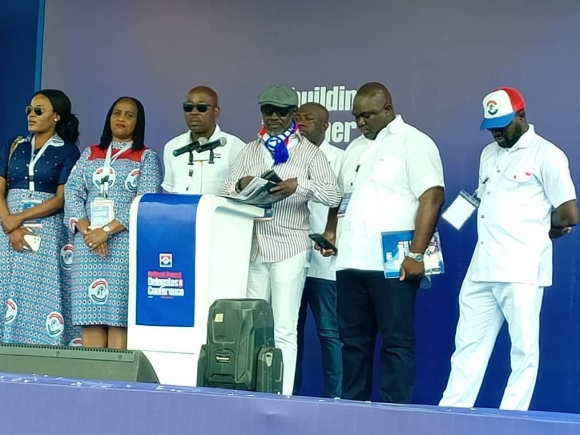The New Patriotic Party (NPP) has expanded its Electoral College for the selection of its presidential candidate, following the approval of a key constitutional amendment during its National Annual Delegates Conference held on Saturday, July 19, 2025, at the University of Ghana Stadium.
The amendment, introduced by the party’s Constitution Amendment Committee, is part of efforts to broaden internal democracy and ensure wider participation in the party’s internal elections. Frank Davies, Chairman of the Committee, announced that the proposal to expand the Electoral College had been adopted by delegates at the conference. He noted that the expanded structure will be used when the party elects its flagbearer for the 2028 general elections.
“Whereas the National Council of the party has, pursuant to Article 13(1) of the constitution, scheduled January 31, 2026, as the date to elect the party’s 2028 presidential candidate,” Mr Davies told delegates, “the National Annual Delegates Conference has adopted an amendment to expand the Electoral College for this purpose.”
The amendment redefines who can vote in the party’s presidential primaries, bringing in a wider range of members who have served in various leadership and representative roles over the years.
The new electoral college structure includes members of the National Council, National Executive Committee, Regional and Constituency Executive Committees, Electoral Area Coordinators, Polling Station Executives, National Council of Elders, National Patrons, all past National Directors, sitting and past MPs, TESCON representatives from each recognised tertiary institution, all card-bearing ministers and deputy ministers, Metropolitan, Municipal, and District Chief Executives (MMDCEs), 15 delegates from every external branch, founder members, and three representatives each from special organs of the party.
This reform is expected to inject institutional memory and broaden the perspectives in the presidential primary process. It also serves to recognise the contributions of a wide array of party veterans and functionaries who have shaped the party’s fortunes at various levels.
Party leaders believe the expanded Electoral College will strengthen internal cohesion and reduce the perception of elite control over leadership selection. It is also intended to give voice to a larger segment of the party’s base as it prepares for what is expected to be a highly competitive flagbearership race ahead of the 2028 general elections.
The NPP’s expanded Electoral College for its 2026 Presidential Primary;
i. All members of the National Council
ii. All members of the National Executive Committee
iii. All members of the Regional Executive Committee
iv. All members of the Constituency Executive Committee
v. All electoral Area Coordinators
vi. All members of the Polling Station Executive Committee
vii. All members of the National Council Of Elders
viii. All National Patrons of the Party
ix. All Past National Directors who are NPP Members
x. All members of Parliament
xi. All Past National Officers
xii. Fifteen (15) Delegates from every External Branch
xiii. Founding members who are signatories to the registration documents of the party at the electoral commission
xiv. One TESCON representative from each recognized tertiary institution
xv. All Card bearing ministers and deputy ministers
xvi. All MMDCEs
The amendment forms part of a broader constitutional review process aimed at restructuring the party after its defeat in the 2024 polls. The conference, themed “Rebuilding Together with Our Values,” brought together over 5,500 delegates from across the country. It featured debates on more than 50 motions, drawn from over 300 amendment proposals submitted by members nationwide.
The adoption of the expanded Electoral College is one of the most significant outcomes of the conference and is expected to influence how future leaders emerge within the NPP. It marks a strategic shift in how the party engages its broader membership and may shape the political dynamics leading up to the 2028 elections.
